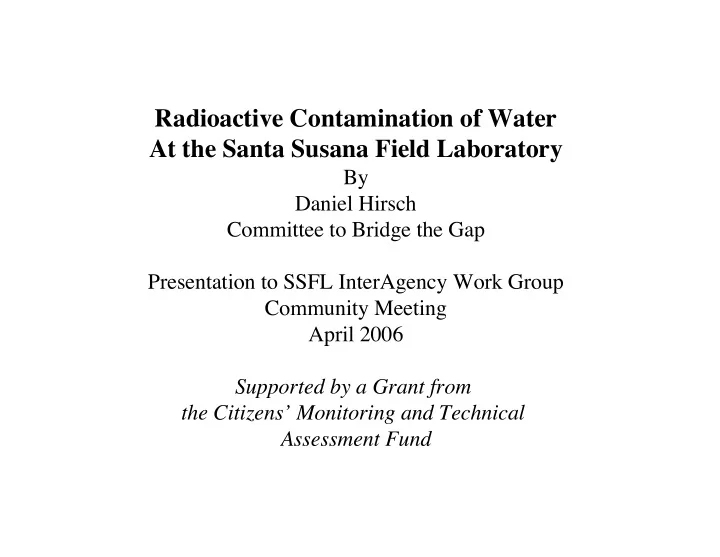

Radioactive Contamination of Water At the Santa Susana Field Laboratory By Daniel Hirsch Committee to Bridge the Gap Presentation to SSFL InterAgency Work Group Community Meeting April 2006 Supported by a Grant from the Citizens’ Monitoring and Technical Assessment Fund
Tritium
Bldg 10 -- Site of SNAP8ER Reactor Accident
Key Facts About Tritium • Radioactive Isotope of Tritium • Forms Radioactive Water - HTO (one of the hydrogen atoms in the water molecule is radioactive) • It is not dissolved in the water; it is the water. • Can’t be filtered out.
Tritium Facts Continued • Moves faster than any other radionuclide in water • Generally the leading edge of a contaminant plume • 12.3 year half life (dangerous ~250 years) • Permissible level in drinking water: 20,000 pico-Curies per liter (pCi/L) • Background tritium levels are ~10 pCi/L
Tritium Findings cont’d. • >20 wells have had statistically significant levels of tritium in groundwater samples, exceeding background • Tritium levels are currently as high as 119,000 pCi/L • More than 110 samples have tested positive for elevated tritium
DHS Conclusions • “It is evident from these sampling results that tritium is present at elevated concentrations in groundwater….” • “Tritium concentrations in some wells not identified as containing statistically significant tritium concentrations are likely elevated also….”
DHS Conclusions (cont’d.) • “The wells containing the highest concentrations are located down gradient from the former test reactor locations in SSFL Area IV.”
What do these Tritium facts tell us? • Tritium found now at 119,000 pCi/L is SIX times the permissible level and 20,000 times background • If the spill occurred~1957, when reactor activity really got going at SSFL, 4 half lives of tritium have passed (49 years/12.3=4) • So tritium concentrations originally would have been 1,900,000 pCi/L • That is 95 times the Safe Drinking Water level
Tritium Implications (cont’d) • But that assumes there has been no dilution or migration in half a century • Infiltrating rainwater dilutes tritium in groundwater • Migration of groundwater dilutes it as well • So the true peak concentrations could have been far higher than 95 times “safe” levels
Implications (cont’d) • Because tritium can’t be filtered, if there were a mix of radionuclides in water, it is tritium you would expect to find in filtered samples
Tritium Not Diminishing Over Time -- Continuing New Source?
Up and Down Pattern Indicative of Slugs of Add’l Tritium?
Adequacy of DOE/Rocketdyne Response • DOE & Rocketdyne failed to measure for tritium for decades • Only when EPA’s Gregg Dempsey did his inspection in 1989 did the issue arise • He was told they had no tritium measurements, so he took samples from a french drain • HE FOUND TRITIUM
Adequacy of Response (cont’d) • Subsequent additional measurements found more tritium • But matter was dropped, not pursued • A couple of years ago DHS identified the T contamination as an unresolved issue, recommended more wells. • The new wells found very high tritium
The Current Problem • Extent and source of tritium contamination still unknown • No plans for cleaning it uip • Very difficult to remediate • Can’t filter it out of the water because it is part of the water - HTO • Raises serious questions about adequacy of monitoring
Current Problem (cont’d) • Because Boeing’s practice of filtering water samples wouldn’t filter out the tritium, but would remove/reduce most other radionuclides, finding tritium raises questions about what other radionuclides would be found if the samples weren’t filtered and the filters discarded.
Radioactivity Other Than Tritium in Groundwater
Groundwater Monitoring Wells (excluding Green piezometer dots) Source: DHS 2004 Groundwater Rpt.
Gross Alpha Radioactivity in Groundwater at SSFL • In 2002 -- the year DHS reviewed -- 15 wells exceeded the drinking water standard of 15 pCi/L • These wells are RS-18, RS-54, RD-07, RD- 18, RD-19, RD-21, RD-24, RDE-27, RD-28, RD-29, RD-34A, RD-35B, RD-50, RD-54A, and RD-63
Boeing’s Explanation • It’s all coming from natural radioactivity, not from us.
Problem with Boeing’s Explanation • All but one of wells that exceeded permissible levels for gross alpha were in Area IV, the nuclear area. • ~85 wells tested below permissible gross alpha levels, most of those in the non-nuclear part of SSFL. • How could high “natural radioactivity” by chance end up only in Area IV, the nuclear site?
Problems with Gross Alpha/Beta Measurements • Office of Environmental Health Hazard Assessment has concluded current gross alpha/beta limits are very much too high to protect public health • Measurements are far too infrequent -- often just one sample per year • Very rarely is there measurement for specific radionuclides
Strontium-90 Recently Found In Surface Water Leaving SFL • 11.4 pCi/L Strontium-90 (unfiltered) found leaving Outfall 3 on April 28, 2005 • 10.8 pCi/L filtered • Maximum Concentration Limit is 8 pCi/L • Source: 2nd Qtr 2005 NPDES Monitoring Report, August12, 2005
Strontium-90 Found Again • “a surface water sample was collected during the 2nd Quarter 2005 from Outfall 003 and analyzed for Strontium-90. This sample result exceeded the permit limit of 8.0 picocuries per liter (pCi/L).” • “follow-up samples were collected…during the 4th Quarter. Appendix F includes the results of the sample analysis. Results did not exceed permit limits.” (emphasis added) • quoted from: Boeing ltr from Steve Lafflam to RWQCB February 15, 2006
HOWEVER… • No strontium data in Appendix F • BUT, in Appendix E, strontium-90 reported at 8.44 pCi/L on October 18, 2005, again leaking from Outfall 003 • 8.44 is GREATER than 8.0
Significance • Outfall 003 is from the Radioactive Materials Handling Facility, a seriously contaminated area • Surface water releases from Outfall 003 flow towards Simi Valley via Brandeis • Strontium-90 has previously been at Brandeis and the RMDF watershed
ACTION TAKEN -- NONE • Water Board has issued NO notices of violation for these strontium-90 exceedances of Boeing’s pollution permit limits
Recommend
More recommend